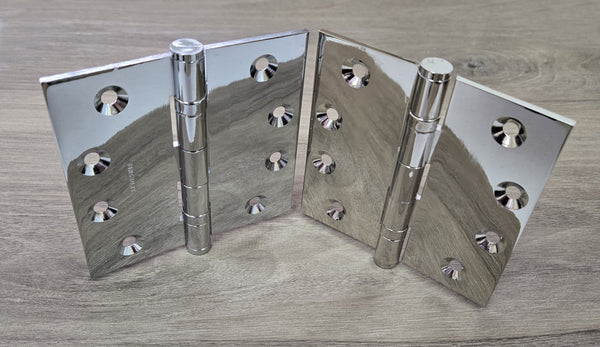When it comes to door installations, the choice of hinges can significantly impact the functionality and durability of the door. There are various types of hinges available in the market, but the two most commonly used in residential and commercial applications are ball bearing hinges and regular (or plain bearing) hinges.
At Finsbury, we make the highest quality brass ball bearing hinges you’ll find anywhere. But we also know that it can be difficult for customers to understand why ball bearing hinges are superior. So we’ve created this helpful guide to shed some light on the differences between the two so you can make an informed buying decision.
Ball Bearing Hinges Explained
Ball bearing hinges, as the name suggests, incorporate ball bearings between the hinge knuckles to reduce friction. They are often used in heavy-duty applications due to their ability to withstand heavy loads.
Functionality of Ball Bearing Hinges
The bearings in ball bearing hinges reduce friction, making it easier and smoother to open and close doors, especially heavy ones. This reduction in friction also makes these hinges more durable and longer-lasting than their regular counterparts.
Cost of Ball Bearing Hinges
While ball bearing hinges offer superior performance, they are typically more expensive than regular hinges. The cost can range significantly based on size, material, and finish. At Finsbury, we pride ourselves on our high quality, domestically made brass ball bearing hinges. You won’t find a better selection or higher quality anywhere else.
Applications of Ball Bearing Hinges
Ball bearing hinges are ideally suited for heavy doors and high-frequency usage areas. They are commonly used on entry doors and any solid-core or wide doors in homes or commercial establishments.
Regular Hinges (Plain Bearing Hinges) Explained
Regular or plain bearing hinges are the most common type of hinges used in residential settings. They are simple in design, with the hinge knuckles rubbing against each other when the door is operated.
Functionality of Regular Hinges
While regular hinges may function smoothly initially, the constant friction between the hinge knuckles can lead to wear and tear over time. This can result in the hinges squeaking or sticking, requiring periodic lubrication to operate smoothly.
Cost of Regular Hinges
Regular hinges are typically more affordable than ball bearing hinges, making them a popular choice for budget-conscious homeowners. However, the potential for more frequent replacements should be considered.
Applications of Regular Hinges
Regular hinges are typically used on lightweight interior doors and in low traffic environments. They are not designed to withstand heavy loads or high-frequency usage.
A Comparative Analysis
In comparing ball bearing hinges and regular hinges, several factors come into play. These include the hinges' durability, price, noise levels, maintenance needs, and suitability for different door types.
Durability
Ball bearing hinges are generally more durable due to their design. The ball bearings reduce friction, resulting in less wear and tear over time. In contrast, regular hinges can wear out more quickly due to the rubbing of the hinge knuckles.
Price
While ball bearing hinges are more expensive upfront, their durability and longevity can make them a more cost-effective option in the long run. Regular hinges, though cheaper initially, may require more frequent replacements, adding to the overall cost.
Noise Levels
Ball bearing hinges are usually quieter than regular hinges. The ball bearings reduce the friction that can cause squeaking in regular hinges.
Maintenance
Regular hinges often require periodic lubrication to prevent squeaking. In contrast, ball bearing hinges typically require less maintenance, making them a more convenient option.
Door Suitability
Ball bearing hinges are ideal for heavy doors and high-frequency usage, whereas regular hinges are more suited to lightweight interior doors in low traffic areas.
Why Finsbury Hinges Are a Cut Above
Finsbury hinges are a premium choice for homeowners and interior designers seeking high-end, high-quality hinges. These brass, ball-bearing hinges are made of architectural-grade, extruded brass that is 3mm thick and the larger 6x6 inch hinges are even thicker at 3.2mm thick for that extra durability. Unlike regular hinges, Finsbury hinges are designed for custom projects and homes, reflecting their commitment to quality and attention to detail.
Wrapping Up
In conclusion, both ball bearing hinges and regular hinges have their pros and cons. Your choice between the two will depend on your specific needs, budget, and the type of doors you have. While regular hinges are a budget-friendly option for lightweight doors, ball bearing hinges, such as Finsbury hinges, offer superior durability and smooth operation, making them an excellent investment for heavy doors and high-end projects.
Shop for high quality brass ball bearing hinges today and upgrade your home in style. Shop Our Selection Now!



